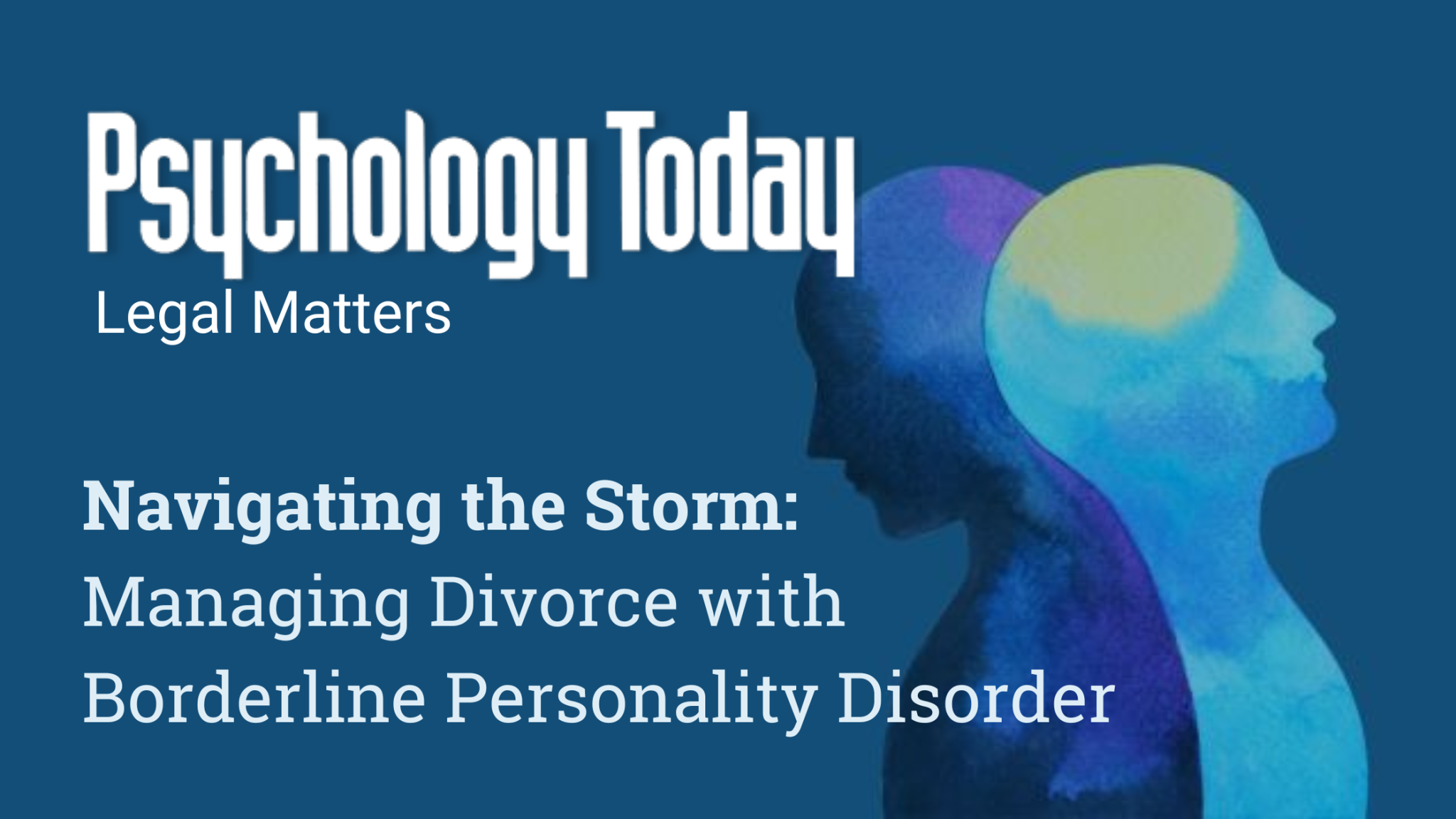Insights for navigating custody battles and high-conflict family legal cases.
One of the most daunting challenges for couples—whether married or going through a divorce—is navigating the complexities of mental health disorders. The stress of marriage and child-rearing, even for the emotionally stable, becomes astronomically harder when coupled with mental health issues.
It is well accepted that extreme stress can exacerbate mental illness. As a family law and matrimonial attorney, I frequently collaborate with therapists and delve into child custody and high-conflict divorce cases. I’ve witnessed countless instances where mental health issues intensify during divorce proceedings.
Mental health issues may surface in the lead-up to divorce or during litigation and are often exacerbated during the trial and even after the dust should have settled. This makes what is a typically challenging and painful process even harder for both spouses, as well as for the children involved.
I have found that child custody litigation can take a disturbingly uncertain turn when a parent suffers from Borderline Personality Disorder (BPD). BPD involves an intense fear of abandonment and taking extreme measures to avoid it, as well as unstable, intense relationships that can suddenly swing from adoration to hatred.
When you combine the feelings of loss and rejection inherent in divorce, the fear associated with litigating child custody issues, and the fact that stressful life events often exacerbate symptoms in those suffering from mental health disorders, you can surmise that BPD sufferers may struggle with good judgment and rational thinking. Their “you’re either with me or against me” mentality can lead to extreme tactics, such as false accusations of horrendous crimes against the other parent.
Consequently, this disorder can drive someone to do what is unthinkable to others. Motivated by what may feel to them like a real sense of desperation to keep their children, a partner may intentionally accuse the other of having committed horrendous crimes. BPD in a parent can manifest as an attempt to destroy their spouse’s reputation, livelihood, and, most importantly, their relationship with their children.
Sadly, I have seen people married to spouses with BPD and other mental health disorders falsely arrested and falsely accused of child abuse, which has sometimes resulted in the falsely accused spouse losing their jobs and reputations in the community. While the falsity of the accusations and their spouse’s mental state may all come to light after a long, protracted, and expensive litigation, the falsely accused must endure what seems like an endless battle. And once falsely accused, the stain of that accusation often persists.
Then there is the damage this kind of experience does to the children who are caught in the middle. What a child suffers when one parent is accusing the other of abuse—falsely and publicly—is truly horrific and can affect them emotionally for the rest of their lives. Unfortunately, it is all too common for children to be interviewed by Child Protective Services and even forced to undergo unnecessary physical examinations as a result of parents with BPD making false accusations to even the score with the parent initiating the divorce.
There are several ways you can help protect yourself when preparing to disentangle from a relationship or a marriage—and ultimately keep or gain custody of your children—when your spouse suffers from BPD or another mental disorder:
Build and Inform Your Team
- If you’re already working with an attorney, promptly share your specific concerns and follow their advice on the next steps tailored to your situation. Ideally work with someone who understands mental health issues and who has worked on cases similar to yours.
- Be sure to let your attorney know about any prior mental health episodes that your spouse had, including prior to the marriage. That should include any hospitalizations, suicidal ideations, suicide attempts, and issues that your spouse may have had with former partners, including any allegations that your spouse has made about former boyfriends or girlfriends.
- Additionally, talk to a therapeutic professional who has experience in this area, and let that person know what you are concerned about and why. Having a third party who has expertise in this area to document concerns and fears, before accusations are made, could be very helpful if your worst fears come true.
- If you are planning to ask for a divorce, it is important to involve a therapist in the process.
Document, Document, Document
- While it is unwise to challenge someone who is acting irrationally, it is ideal if you can document any erratic behavior on the part of your spouse, including details such as times, places, etc.
- As hard as it might be, it is important to have witnesses to as many of your interactions with your spouse and children as possible, including—if you are already separated—having conversations in a public place or with someone neutral present. Do not isolate yourself or allow yourself to be isolated.
- Keep a record of any concerning interactions, especially those involving your children. This documentation can be crucial if allegations are made in the future. If you are still living in the same residence, it is also important to be very careful about any interactions with your spouse and your children. Be extremely mindful of what you say and how you say it to ensure something is not later interpreted in an irrational way.
Important: If you have been charged with any crime against your spouse or child, you must abide by any orders of protection that have been filed, even if you know they were put in place due to a false allegation. Be sure to cooperate with all government agencies and the Court, in concert with your lawyer and therapist.
Above all, place your children’s needs first. And remember, no matter what, this is your child’s parent. That means that this person will be in your child’s life forever and you need to find a way to foster a relationship between your child and your child’s parent in a safe way.
My falsely accused clients often mention ignoring signs of mental illness, including prior hospitalizations, suicide attempts, unusually ugly breakups with prior boyfriends or girlfriends, prior orders of protection, and even prior accusations.
So, as I have said before: the very best way to protect yourself from experiencing any of the above is to recognize the signs of mental illness. Love does not need to be blind and the signs should not be overlooked or ignored. Be careful with whom you have a relationship, a child, and a marriage.
Most importantly, please take care of yourself, and your children, during this incredibly difficult time.
Note: These opinions should not substitute as legal or mental health advice, as each case is unique. If you are facing a similar situation, it is critical to contact a family law attorney or mental health professional in your area as soon as possible.

